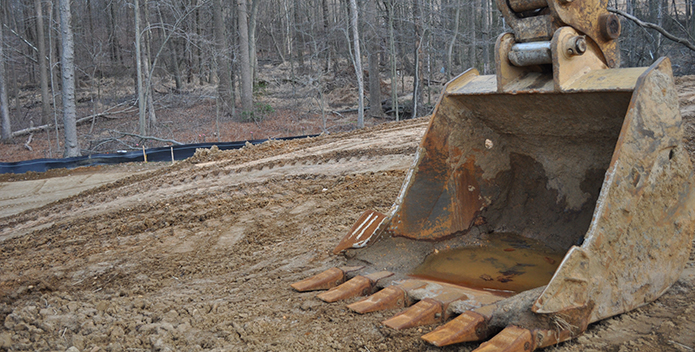The following was first published in the Bay Journal.
Forest destruction in Maryland is a major concern of the state legislature this year and with good reason. We literally can't live without woodlands. And we can't save the Chesapeake Bay if development continues to bulldoze them—currently at the rate of more than 1,800 acres of forests a year. Luckily, a new bill in the legislature can help save some of the state's best forests.
Dense woodlands are one our most cost-effective pollution filters. Forests collect, clean, and store water like giant sponges. They capture carbon dioxide and make oxygen. Forests are the lungs of the Earth.
We pay for forest loss in ecological and economic costs. In the last 45 years, the loss of forests in the Baltimore-Washington region caused a 19 percent increase in polluted runoff costing more than $1 billion, according to the Maryland Department of Natural Resources.
Meanwhile, Bay taxpayers spend billions on projects to filter polluted runoff that forests do for free. As more landscape turns into shopping centers, subdivisions, and parking lots, we are forced to construct expensive manmade projects that filter polluted water running off the asphalt. Many local governments are financially burdened by this work.
And of course, forests have a special value to human beings beyond their economic or even ecological worth. Jodi Rose of Interfaith Partners for the Chesapeake perhaps says it best: "By not protecting our healthy forests today, we are literally stealing trees from the next generation. These are the trees that God intended to benefit all people and all generations, filter tomorrow's air, soak up tomorrow's rainwater and support the entire web of life. If we fail to change policies today, we are turning our backs on the next generation. Thou shall not steal trees from the next generation."
Maryland recognized the problems stemming from forest loss decades ago. In 1991, the state legislature became the first in the nation to pass legislation to slow forest loss from development—the Forest Conservation Act.
The FCA did some good, but numerous blue ribbon commissions, and recently a study by the University of Maryland, discovered serious flaws in the law. Yet the Maryland General Assembly has failed to revisit the act in any meaningful way.
The 2016 UMD study, published by David Newburn of the College of Agriculture & Natural Resources, identified a disturbing deficiency in the FCA. In a bizarre twist, the law actually allows developers to clear the best forests we have. The law often protects woodlands of lesser value, but fails when bulldozers come for our most intact, ecologically valuable "priority" forests.
The Chesapeake Bay Foundation's research found numerous development projects across several counties where builders virtually clear-cut 70–80 percent of the large priority forests on the tracts, often with little requirement to replant trees.
An attempt to improve the FCA in the 2017 legislation died in the House. That legislation would have increased replanting requirements when forests are cleared. Some local government officials objected to the proposal, saying there often isn't enough local land to replant what is cut down.
Since last spring, our coalition's members have met with numerous staff members of local governments who administer the FCA and have the best understanding of how the law works—or doesn't work.
They gave us great suggestions for improving it. Those recommendations form the basis of new legislation. For example, some local governments noted that there are large sums that are supposed to go to reforestation projects sitting in accounts unable to be spent because of red tape in the old law.
Sen. Ron Young, D-Frederick, and Del. Anne Healey, D-Prince George's, are the chief sponsors of this bill, SB 610/HB 766, which incorporates local officials' suggestions. We believe this legislation is a practical, effective means of solving the flaws pointed out by numerous studies. It avoids wholesale changes and a one-size-fits-all solution. Instead, it clarifies key elements of the existing law to ensure that it works as it was intended.
Those changes include:
- Clearly define priority forests;
- Clarify what justifies clearing priority forests;
- Require that an acre of forest be replanted for each acre of priority forest cut down;
- Clarify that forest protection planning must come early in the development process; and
- Authorize and encourage better spending of fee in-lieu money so state, local and nonprofit agencies and groups that already replant trees can use some of those fees.
This legislation is a badly needed update of a 26-year-old law that wasn't working as effectively as intended. These simple updates benefit local governments by clarifying muddy parts of the law. The changes help all Marylanders continue to enjoy the health, ecological, and economic benefits of forests. The updates will also help us save the Chesapeake Bay and its rivers and streams.
This bill would benefit urban areas as well. Darin Crew, senior manager of forestry and restoration at Blue Water Baltimore, noted that urban forests provide refuge from the hot summer temperatures resulting from the urban heat island effect: "Shade helps us conserve energy, have cooler outside spaces to catch the bus, talk to our neighbors, and just be outside. Baltimore's forests range from individual street trees to large urban parks in size and scale. While we have large urban parks, small pocket parks and private property forests are key components to a lot of our medium tree canopy neighborhoods. Strengthening the FCA will help preserve and reduce impacts to these community assets."
We will pay if the legislature again fails to update the FCA—with our health, the vitality of our communities, and our tax dollars.
Ben Alexandro
Issues in this Post
Forest Loss Advocacy Conservation Forest Loss Habitat Loss Land Use Politics Runoff Pollution Smart Growth Water Quality CBF in Maryland Eastern Shore Office Maryland Office, Annapolis



